
- •Environment and ecology Chapter 1
- •Chapter 2 Oceans. Natural parks and animals
- •The oceans
- •Why are the Oceans Salty?
- •Why is the ocean blue?
- •What Causes Waves?
- •What causes the tides?
- •Tsunami
- •Coral Reefs
- •National Parks and Climate Change
- •Animal invaders How much danger are we in? How many invaders are there?
- •Chapter 3 Atmosphere, climate and weather.
- •Chapter 4. Sustainable Development and Environmental Protection
National Parks and Climate Change
(A) National parks, nature reserves, protected areas and sites of special scientific interest (SSSIs) are an important part of the natural landscape in most countries. Their habitat and terrains vary massively from tundra and glacier parks in the north to wetlands in Europe, steppes in central and Eastern Europe, and prairie grasslands and deserts in other areas. Virtually all kinds of landscape are protected somewhere. And these protected areas are important for the variety of plant and animal life they harbour: caribou, bears, wolves, rare types of fish and birds.
(B) But these areas are under threat from a recent peril-global climate change. No amount of legislation in any one country can protect against a worldwide problem. What exactly are the problems caused by climate change? David Woodward, head of the British Council for Nature Conservation, spoke to 'Science Now' about some of these areas and his first point highlighted the enormous variation in nature reserves.
(C) "Each park or reserve is an ecosystem," he says, "and the larger reserves, such as those in Canada, may have several types of ecological subsystems within it. There are reserves which are half the size of Western Europe, so it doesn't make sense to talk about them as if they were all the same, or as if the microclimates within them were uniform." Woodward outlines some of the dangers posed by climatic change to parks in the northern Americas, for example.
D "If climatic change is severe, and in particular if the change is happening as quickly as it is at the moment, then the boundaries of the park no longer make much sense. A park that was designated as a protected area 90 years ago may suffer such change in its climate that the nature of it changes too. It will no longer contain the animal and plant life that it did. So the area which once protected, say, a species of reindeer or a type of scenery, will have changed. In effect, you lose the thing you were trying to protect." This effect has already been seen in Canada, where parks which once contained glaciers have seen the glaciers melted by global warming.
E Jennie Lindstrom, Chief Executive Officer of H20, the charity which campaigns on an international level on behalf of mainland Europe's protected wetland and wilderness areas, is even more pessimistic. In a letter to Science Now, she has asserted that up to 70% of such areas are already experiencing such "significant change ... in climate" that the distribution patterns of flora and fauna are changing, and that all areas will eventually be affected. She estimates that the most profound change is occurring in the northernmost parks in areas such as Finland, Greenland, Iceland and northern Russia, but adds that "there is no place which will not suffer the effects of global warming. What we are seeing is a massive change in the environment - and that means the extinction of whole species, as well as visual and structural changes which means that areas like the Camargue may literally look totally different in 50 or 60 years' time."
F The problems are manifold. First, it is difficult or impossible to predict which areas are most in need of help – that is, which areas are in most danger. Predicting climate change is even more unreliable than predicting the weather. Secondly, there is a sense that governments in most areas are apathetic towards a problem which may not manifest itself until long after that government's term of office has come ’o an end. In poor areas, of course, nature conservation is low on the list of priorities compared to, say, employment or health. Third, and perhaps most important, even in areas where there is both the political will and the financial muscle to do something about the problem, it is hard to know just what to do. Maria Colehill of Forestlife, an American conservation body, thinks that in the case of climate change, the most we can realistically do is monitor the situation and allow for the changes that we cannot prevent, while lobbying governments internationally to make the changes to the pollution laws, for example, that will enable us to deal with the causes of the problem. "I am despondent," she admits. "I have no doubt that a lot of the work we are doing on behalf of the North American lynx, for example, will be wasted. The animal itself can live in virtually any environment where there are few humans, but of course its numbers are small. If climate change affects the other animal life in the areas where it now lives, if the food chain changes, then the lynx will be affected too. Less food for the lynx means fewer lynxes, or lynxes with nowhere to go."
G Certainly, climate change is not going to go away overnight. It is estimated that fossil fuels burnt in the 1950s will still be affecting our climate in another 30 years, so the changes will continue for some time after that. If we want to protect the remnants of our wild landscapes for future generations, the impetus for change must come from the governments of the world.
9.1 Do the following statements agree with the information given in the text? Next to each sentence, write YES if the statement agrees with the information, NO if the statement contradicts the information, NOT GIVEN if there is no information on this in the text:
Every country has protected areas or national parks.
Countries can protect their parks by changing their laws.
A protected area or park can contain many different ecosystems.
David Woodward thinks that Canadian parks will all be different in 90 years.
Canada, more than any other country, has felt the effects of global warming.
H20 works to protect wetlands everywhere.
Some parts of the world will feel the results of global warming more than others.
9.2 Complete the summary below. Choose the answers from the box beneath it. There are more words than spaces, so you will not use all given words:
There are1) _______ in attempting to stop the effects of 2) _______ . One is the
problem of predicting change. Another is a lack of 3) _______ to change the situation; most governments' interest in the problem is limited because the problem will not become very serious 4) _______. Finally, there is the problem of what action we should actually take. One solution is both to keep an eye on the situation as it develops, and to push for changes 5) _______. Even if we do this, the problem is not going to 6) _______, since it takes a considerable time for global
warming to happen.
governmental willingness internationally go away overnight |
lots of ways for many years many problems |
global warming locally after all |
Task 10. Preparing for writing
1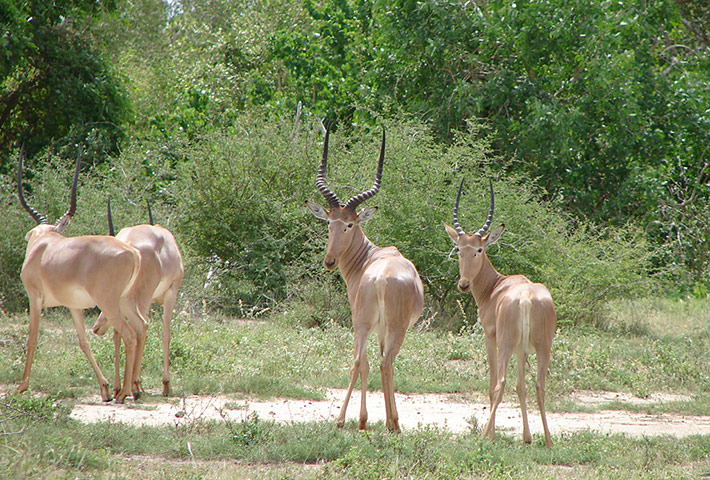 0.1
Read
the rubric and underline the key words, then answer the questions:
0.1
Read
the rubric and underline the key words, then answer the questions:
A wildlife magazine has invited readers to write articles discussing this question: “Should we create more national parks to save endangered species?” Write an article for the magazine, giving your opinion and justifying your point of view.
What is a national park?
How many endangered species can you name? Why are they endangered? What could we do to protect them?
What must be included in this article?
... the pros and cons of national parks
... your opinion and viewpoints, with examples to support your opinion
... suggestions of several other ways we could protect endangered species
Who is going to read your composition?
wildlife lovers of all ages
the other students in your class
Which style of writing will you use?
rather formal
friendly, informal, humorous
What tenses will you use?
past tenses
present tenses
Which of these phrases would you expect to read in the article?
are in real danger of becoming extinct
cute, fluffy puppies and kittens
protect the animal’s natural habitat
can still remember the first pet I ever had
oppose the creation of national parks
live in safety in their natural environment
good company and great fun to watch
10.3 Read the article and label the paragraphs with these headings:
writer’s arguments and justification |
summary of writer’s opinion |
introduction & statement of opinion |
opposing argument(s) & justification |
Introduction |
Should We Create More National Parks to Save Endangered Species?
|
Para 1 …………… ……………
|
Main Body |
In addition, national parks protect animals from the danger of being hunted. A major reason why many species are endangered is that the animals are killed by hunters – for their skins, horns and so on, or even simply for sport. |
Paras 2+ 3 …………… …………… |
|
Para 4 ………….. ………….. |
|
Conclusion |
All in all, though, these drawbacks are far less important than the benefits of national parks. These parks allow animals to live in safety in their natural environment by protecting them from their greatest enemy – humans. |
Para 5 …………. …………. |
10.4 Replace the words in bold with the synonyms from the list:
first of all – furthermore – in conclusion – however – for instance
10.5 Answer the following questions:
What is the writer’s opinion of national parks?
According to the article, what are the main ways national parks protect endangered species?
Why do some people oppose the creation of national parks what reasons are given to support this opposing point of view?
What is the writer’s opinion about the disadvantages of national parks?
10.6 Fill in the prepositions then make up sentences using these phrases:
to be ___ danger ___sth
trees are cut ___ by logging companies
to be threatened ___ extinction
animals are killed ___ hunters ___ skins, horns, etc
to interfere___ nature
to breed ___ the wild
to live ___ safety
___ the other hand
to live ___ captivity
the benefits ___ sth
10.7 Write an article to a magazine describing possible ways of protecting any endangered marine species. Express your opinion and justify your point of view. Use as many words and expressions from your current material as possible.
Task 13. The following idioms are connected with animals. Match them to their meanings. In pairs interview each other asking and answering questions below in turns:
1. a whale of a time |
a. without resistance |
2. two shakes of a lamb’s tail |
b. a person who prefers to be alone |
3. a leopard cannot change its spots |
c. a small container, sometimes in the shape of a pig, which is used by children for saving money |
4. a lamb to the slaughter |
d. the largest or best part of something when it is divided |
5. a lion’s share |
e. to persuade someone by telling them repeatedly to do something, or to question someone repeatedly |
6. a lone wolf |
f. an exceptionally large, fine, astonishing |
7. the rat race |
g. to detect something suspicious |
8. to wolf one’s food down |
h. a person who is different from the rest of their family or another group, and who is considered bad or embarrassing |
9. to smell a rat |
i. to ask for help when you do not need it |
10. to go the whole hog |
j. old-fashioned |
11. to badger |
k. a person who drives in a dangerous way without thinking about the safety of other road users |
12. black sheep |
l. to annoy somebody very much |
13. to cry wolf |
m. people cannot change their character, especially if they have a bad character |
14. to get someone’s goat |
n. to eat very quickly, to swallow without chewing |
15. road hog |
o. to do something as completely as possible |
16. to be a guinea pig |
p. a way of life in modern society, in which people compete with each other for power and money |
17. to take the bull by the horns |
q. to face a difficult or dangerous situation directly and with courage |
18. white elephant |
r. to make somebody seem stupid |
19. piggy bank |
s. a thing that is useless and no longer needed, although it may have cost a lot of money |
20. to make a monkey out of someone |
t. a person used in medical or other experiments |
Does your teacher ever have to badger you to get your homework?
Who is the black sheep of your family and what is it about them that is so bad?
Did you ever cry wolf when you were young, and then no one believed your stories?
Who really annoys you and gets your goat? Why do they get your goat?
What do you think of road hogs? How can the police stop their bad manners and dangerous driving?
Have you ever been a guinea pig and let someone test something on you?
Do you always take the bull by the horns and make strong decisions?
Has your government ever wasted money on a white elephant – a project that was a really, really bad idea that no one used?
Has anyone made a monkey out of you and made you look foolish?
When was the last time you had a whale of a time? What was so great about it?
What was the last thing you did in two shakes of a lamb’s tail?
Do you believe that a leopard cannot change its spots? Are you flexible?
Have you ever seen a sporting competition with a strong and weak team – like lambs to the slaughter?
Are you a lone wolf or do you like being with other people?
When was the last time you were so hungry you wolfed your food down in a few seconds?
Are you good at smelling a rat and noticing suspicious things?
Do you always go the whole hog and do, buy, eat… everything possible?
Task 14. Match the pictures and the names of the animals:
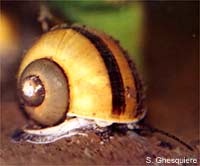

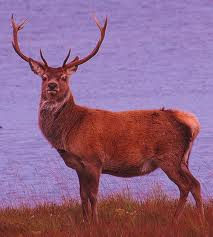
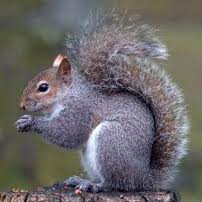
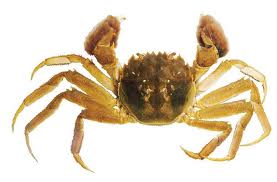
1_______ 2_________ 3________ 4_________ 5_________
red deer
rabbits
mitten crab
snail
grey squirrel
Skim the article and choose the best summary:
It is about the problems that new animals face in new environments.
It is about how foreign animals affect local animals and environments.
It is about the similarities between the natural environment and the business world.

 Don’t
you find it worrying that more and more species of animals are in
real danger of becoming extinct? I personally believe that we
must save these animals, and that the best way to do this is for
governments to create more national parks.
Don’t
you find it worrying that more and more species of animals are in
real danger of becoming extinct? I personally believe that we
must save these animals, and that the best way to do this is for
governments to create more national parks.
 To
begin with,
national
parks protect the animals’ natural habitat. If this habitat is
destroyed –
for
example,
when
farmers clear jungle areas for new fields, or trees are cut down
by logging companies – many animals are unable to survive, and
more species are threatened with extinction.
To
begin with,
national
parks protect the animals’ natural habitat. If this habitat is
destroyed –
for
example,
when
farmers clear jungle areas for new fields, or trees are cut down
by logging companies – many animals are unable to survive, and
more species are threatened with extinction.
 On
the other hand,
some
people oppose the creation of national parks because they
consider it wrong to interfere with nature. They claim that wild
animals are happier living in their natural habitat, despite the
dangers they face. They also point out that a few species are
more likely to breed in the wild than in captivity.
On
the other hand,
some
people oppose the creation of national parks because they
consider it wrong to interfere with nature. They claim that wild
animals are happier living in their natural habitat, despite the
dangers they face. They also point out that a few species are
more likely to breed in the wild than in captivity.